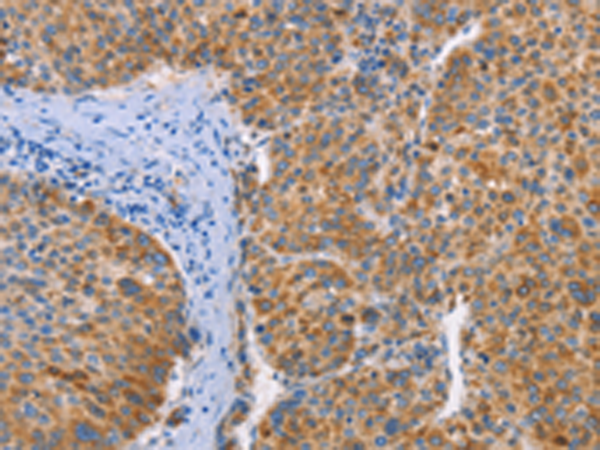

| WB | 1/500-1/2000 | Human,Mouse,Rat |
| IF | 咨询技术 | Human,Mouse,Rat |
| IHC | 1/25-1/100 | Human,Mouse,Rat |
| ICC | 技术咨询 | Human,Mouse,Rat |
| FCM | 咨询技术 | Human,Mouse,Rat |
| Elisa | 1/2000-1/5000 | Human,Mouse,Rat |
| Aliases | HFREP1; HP-041; LFIRE1; LFIRE-1 |
| WB Predicted band size | 36 kDa |
| Host/Isotype | Rabbit IgG |
| Antibody Type | Primary antibody |
| Storage | Store at 4°C short term. Aliquot and store at -20°C long term. Avoid freeze/thaw cycles. |
| Species Reactivity | Human, Mouse, Rat |
| Immunogen | Fusion protein of human FGL1 |
| Formulation | Purified antibody in PBS with 0.05% sodium azide and 50% glycerol. |
+ +
以下是关于FGL1抗体的3篇模拟参考文献示例(仅供参考,具体文献需通过学术数据库核实):
---
1. **文献名称**:*FGL1/LAG-3 interaction as a novel immune checkpoint in cancer*
**作者**:Wang, J., Sanmamed, M.F., Datar, I., et al.
**摘要**:该研究首次报道FGL1作为LAG-3的功能性配体,揭示其通过抑制T细胞活性促进肿瘤免疫逃逸。作者开发了靶向FGL1的单克隆抗体,实验显示阻断FGL1-LAG-3通路可显著恢复抗肿瘤免疫反应并抑制小鼠模型中的肿瘤生长。
2. **文献名称**:*Therapeutic targeting of FGL1 in colorectal cancer enhances antitumor immunity*
**作者**:Deng, M., Li, Y., Zheng, Y., et al.
**摘要**:本研究证明结直肠癌中FGL1高表达与免疫抑制微环境相关。通过开发人源化抗FGL1抗体,研究者在小鼠模型中验证其可有效抑制肿瘤进展,并增强CD8+ T细胞浸润及细胞因子分泌。
3. **文献名称**:*FGL1 blockade synergizes with PD-1 inhibitors in advanced solid tumors*
**作者**:Zhou, G., Xing, Y., Zhang, Q., et al.
**摘要**:临床试验前研究表明,抗FGL1抗体与PD-1抑制剂联用可产生协同抗肿瘤效果。机制上,FGL1抗体通过逆转LAG-3介导的T细胞耗竭,同时增强PD-1阻断的疗效,为联合免疫治疗提供了新策略。
---
如需真实文献,建议通过**PubMed**或**Web of Science**以“FGL1 antibody”、“FGL1 immunotherapy”等关键词检索。
**Background of FGL1 Antibody**
Fibrinogen-like protein 1 (FGL1), a member of the fibrinogen-related protein family, is a secreted glycoprotein implicated in immune regulation and cancer progression. It gained attention as a functional ligand of lymphocyte-activation gene 3 (LAG-3), an inhibitory immune checkpoint receptor expressed on T cells. FGL1-LAG-3 interaction suppresses T cell activation, enabling tumor immune evasion. Overexpression of FGL1 in cancers (e.g., liver, lung, and pancreatic) correlates with poor prognosis, suggesting its role as a therapeutic target.
FGL1 antibodies are designed to block this interaction, restoring anti-tumor T cell activity. Preclinical studies demonstrate that FGL1 antibodies enhance immune responses and inhibit tumor growth in murine models, particularly in tumors resistant to PD-1/PD-L1 blockade. These findings position FGL1 as a promising complementary target in cancer immunotherapy.
Beyond oncology, FGL1 is involved in metabolic and inflammatory processes, such as liver regeneration and viral hepatitis. Structurally, FGL1 contains a fibrinogen-like domain and forms disulfide-linked homodimers. Its expression is elevated in certain tissues under pathological conditions, making it a potential biomarker. Current research focuses on optimizing FGL1 antibody specificity and evaluating safety in clinical trials, aiming to expand immune checkpoint therapy options.
×